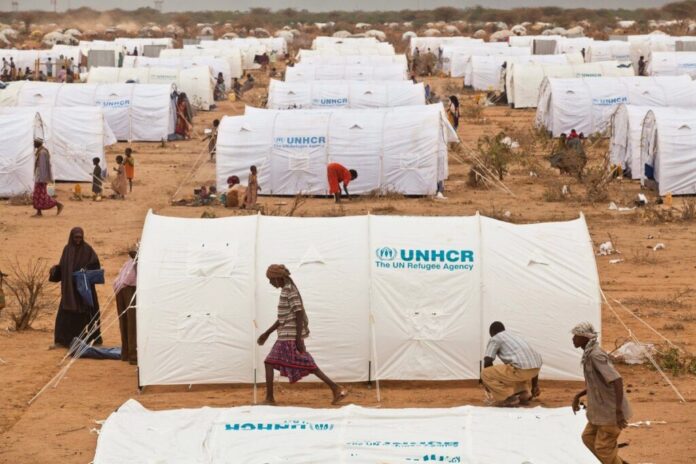NAIROBI (Kaab TV) – In the parched expanse of Kenya’s Dadaab refugee camp, thousands of Somali families have sought refuge from not only the specter of war but increasingly the ravages of climate change.
Since its establishment in 1991 as a haven for Somalis fleeing civil war, Dadaab has witnessed a new wave of climate refugees. Record-breaking droughts, followed by devastating El Niño-induced floods in early 2024, have uprooted communities already reeling from one of the worst droughts in four decades.
Amnesty International has documented the surge of climate-displaced Somalis seeking safety in Kenya.
Here, six Somali refugees recount their harrowing journeys and the challenges of rebuilding lives far from their ancestral lands, offering a poignant glimpse into the human toll of climate change.
As world leaders convene in Baku, activists are urging wealthier nations to increase funding for climate adaptation and the Loss and Damage Fund to support those bearing the brunt of the climate crisis.
Ahmed Haji, 33: “The floods destroyed our community in every way.”
Ahmed, a farmer from Dinsoor, Somalia, saw his livelihood vanish as droughts parched his fields starting in 2021.
Just as his community clung to the hope of rain, floods devastated the region, bringing illness and despair.
“Without money for medicine, I relied on traditional remedies and prayers for my children’s recovery,” Ahmed said.
When nothing improved, he made the heart-wrenching decision to leave. The 15-day journey to Dadaab was grueling, traveling with eight families and carrying essentials like maize porridge, milk, and water.
Upon arrival, malnutrition landed his family in a hospital—the first Ahmed had ever seen. His younger children received their first vaccinations, and Ahmed even experienced the birth of a child in a hospital for the first time.
“I cannot imagine returning to Somalia, where healthcare and hope are absent,” he said.
Halimo Osman, 40: “I hold onto the hope that maybe one day I can return to my farm.”
Halimo, from Sakow in Middle Juba, endured three years of drought followed by floods in 2022 that obliterated her crops.
Forced to leave her village, she sold everything to ensure her family’s survival.
“I asked myself, ‘How can you stay in a place where your children do not have food?’” she recounted.
The journey to Dadaab took two days in a hired vehicle, with help from well-wishers along the way.
Now, Halimo and her children have access to food and shelter in Dadaab, though she longs for the chance to return to her farm.
“I fear our village may never recover, and the dream of returning feels further away with each passing day,” she said.
Abdirahman Yonis, 18: “I hope for a future better than the one I fled.”
Abdirahman, from Marerey near the Juba River, was just 18 when floods swept away his home and livelihood in 2023.
The contaminated river brought illness to his family, compounding their struggles.
Now in Dadaab, Abdirahman is determined to rebuild his life for the sake of his young family.
“I think of what we lost, but I hold onto hope for a future better than the one we fled,” he said.
Khalid Elmi, 51: “I had no choice but to leave.”
Khalid, a farmer from Baladu Rahmo, Jubaland, endured seven years of drought that reduced his food supply to mere kilograms every six months.
Pest infestations and famine claimed the lives of loved ones, including his mother and one of his eight children.
In 2022, Khalid joined the exodus to Dadaab, leaving behind a village reduced to just 16 people. “I knew I had no choice but to leave,” he said.
Shukri Ilyas, 51: “I do not see myself or my family returning to Somalia.”
Shukri once thrived as a farmer until the drought destroyed her crops and livestock. Forced to sell her remaining cattle, she and her children endured an 18-day journey by donkey cart to Dadaab.
The trek was fraught with hardship; one woman in their group suffered a stillbirth, and they had to bury the child en route.
“Now, Dadaab is my new home. My children can go to school here—something that would be impossible in Somalia,” Shukri said.
Aden Mohammed, 58: “I am motivated by the hope of providing my children with a brighter future.”
Aden, a herder from Warangob in Bu’ale, lost his livelihood to drought and floods. Once harvesting up to 80 sacks of sorghum, he now faces an uncertain future.
Determined to escape worsening conditions, Aden embarked on a 14-day journey to Dadaab with his family.
The trip tested their resilience, leaving them malnourished and exhausted.
Despite the challenges, Aden remains hopeful. “I value education deeply and dream of giving my children a brighter future,” he said.


